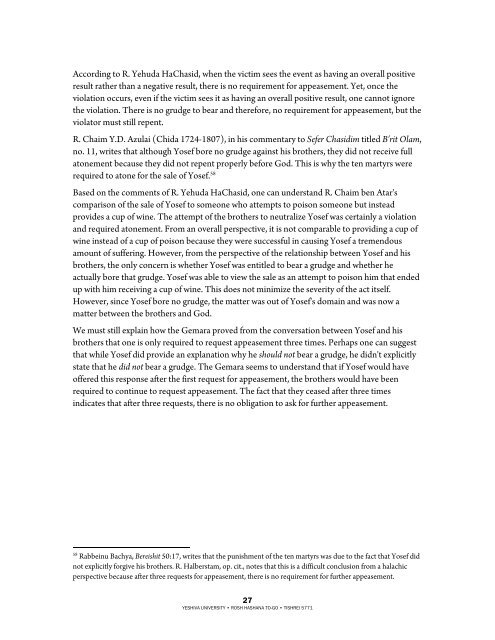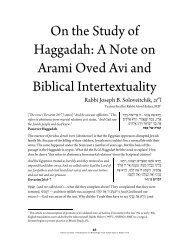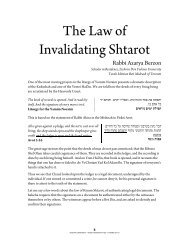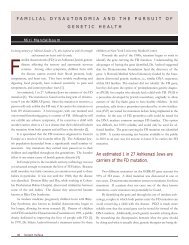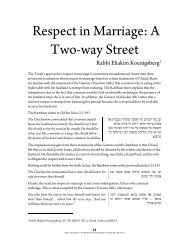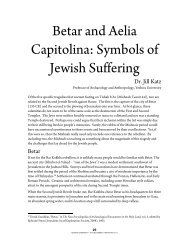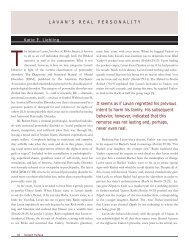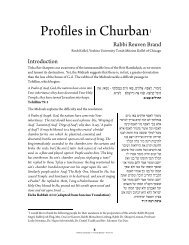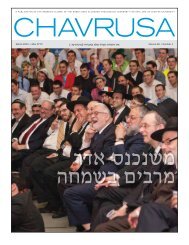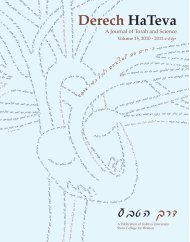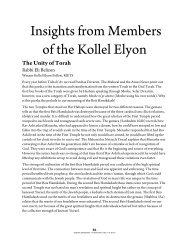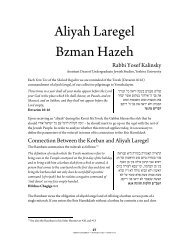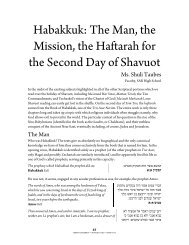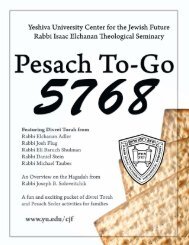YESHIVA UNIVERSITY • ROSH HASHANA TO-GO ... - YUTorah.org
YESHIVA UNIVERSITY • ROSH HASHANA TO-GO ... - YUTorah.org
YESHIVA UNIVERSITY • ROSH HASHANA TO-GO ... - YUTorah.org
Create successful ePaper yourself
Turn your PDF publications into a flip-book with our unique Google optimized e-Paper software.
According to R. Yehuda HaChasid, when the victim sees the event as having an overall positive<br />
result rather than a negative result, there is no requirement for appeasement. Yet, once the<br />
violation occurs, even if the victim sees it as having an overall positive result, one cannot ignore<br />
the violation. There is no grudge to bear and therefore, no requirement for appeasement, but the<br />
violator must still repent.<br />
R. Chaim Y.D. Azulai (Chida 1724-1807), in his commentary to Sefer Chasidim titled B'rit Olam,<br />
no. 11, writes that although Yosef bore no grudge against his brothers, they did not receive full<br />
atonement because they did not repent properly before God. This is why the ten martyrs were<br />
required to atone for the sale of Yosef. 58<br />
Based on the comments of R. Yehuda HaChasid, one can understand R. Chaim ben Atar's<br />
comparison of the sale of Yosef to someone who attempts to poison someone but instead<br />
provides a cup of wine. The attempt of the brothers to neutralize Yosef was certainly a violation<br />
and required atonement. From an overall perspective, it is not comparable to providing a cup of<br />
wine instead of a cup of poison because they were successful in causing Yosef a tremendous<br />
amount of suffering. However, from the perspective of the relationship between Yosef and his<br />
brothers, the only concern is whether Yosef was entitled to bear a grudge and whether he<br />
actually bore that grudge. Yosef was able to view the sale as an attempt to poison him that ended<br />
up with him receiving a cup of wine. This does not minimize the severity of the act itself.<br />
However, since Yosef bore no grudge, the matter was out of Yosef's domain and was now a<br />
matter between the brothers and God.<br />
We must still explain how the Gemara proved from the conversation between Yosef and his<br />
brothers that one is only required to request appeasement three times. Perhaps one can suggest<br />
that while Yosef did provide an explanation why he should not bear a grudge, he didn't explicitly<br />
state that he did not bear a grudge. The Gemara seems to understand that if Yosef would have<br />
offered this response after the first request for appeasement, the brothers would have been<br />
required to continue to request appeasement. The fact that they ceased after three times<br />
indicates that after three requests, there is no obligation to ask for further appeasement.<br />
58 Rabbeinu Bachya, Bereishit 50:17, writes that the punishment of the ten martyrs was due to the fact that Yosef did<br />
not explicitly f<strong>org</strong>ive his brothers. R. Halberstam, op. cit., notes that this is a difficult conclusion from a halachic<br />
perspective because after three requests for appeasement, there is no requirement for further appeasement.<br />
27<br />
<strong>YESHIVA</strong> <strong>UNIVERSITY</strong> <strong>•</strong> <strong>ROSH</strong> <strong>HASHANA</strong> <strong>TO</strong>-<strong>GO</strong> <strong>•</strong> TISHREI 5771


